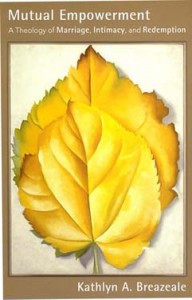 Breazeale, Kathlyn A. Mutual Empowerment: A Theology of Marriage, Intimacy, and Redemption. Fortress Press, 2008. ISBN: 978-0-8006-2039-4.
Breazeale, Kathlyn A. Mutual Empowerment: A Theology of Marriage, Intimacy, and Redemption. Fortress Press, 2008. ISBN: 978-0-8006-2039-4.
Meet the Author
Kathlyn A. Breazeale is Associate Professor of Religion at Pacific Lutheran University.
Some of the most influential ideas informing marriage are traditional Christian ones. Kathlyn Breazeale, reframes marriage in light of a generation of theological insights, from feminists and process theologians. She shows how a recast theology of marriage can move marriage from unequal power and violence to mutual empowerment.
In successive chapters Breazeale unfolds both the classical and alternate traditions on crucial ideas such as sin and redemption, body and soul, and sexuality and spirituality. The volume culminates in a theology of mutual empowerment and redemption through intimacy for marriage partners.
So What?
This is the sort of book that won’t appear on the must read list for many, yet it offers some challenging questions worth considering. Most recent literature about marriage from a Christian viewpoint focuses on one of two options: (1) reinforcing the complementarian view of gender specific marriage roles and the idea of male headship (a heirarchial view of marriage) or (2) the more progressive egalitarian approaches that consider the genders as equal and do not seek to prescribe set roles based on gender (a flat view of marriage). Breazeale argues that the current options simply don’t work and that this is evidenced by the failure of marriages (65% of all marriages in the United States end in divorce) and the prevalence of violence within intimate relationships by the male partner.
The proposed alternative view is a radical form of egalitarianism: mutual empowerment (of two equal partners not bound by cultural gender roles). With this new option, power is not that of the husband or the wife but rather comes from the bond of marriage and is understood as relational. In the ideal, “couples practicing relational power redeem each other from the restriction of gender roles and restore their relationship to the mutuality that God intended in the order of creation” (p.13). Further, she argues that the earliest Christian community was based on a discipleship of equals not acceptance of the dominant societal patriarchal norm and that this was consistent with the teaching of Jesus and of Paul.
In closing, Breazeale suggests, “Christian denominations should develop church school curricula and catechetical materials that present countercultural definitions of masculinity, definitions that do not include proving one’s manhood through power over others or violence. For example, educational materials could focus on interpretations of Jesus as a man who used nonviolent methods to oppose unjust social structures of his time. Jesus could also be portrayed as a man who, according to many of the Gospel stories, treated women as equals . . .” (p.159). Local congregations must discuss issues as important and relevant as the role of gender and the ideals for Christian marriage. When was the last time you participated in a small group discussion, heard a sermon or lecture, or engaged in study with others about these issues?
Keep thinking:
- Is your current view one that was handed to you by others or one you have come to name as your own only after significant struggle?
- How can a Christian view of marriage redeem and transform the current cultural understanding that tends to focus primarily on the legal aspects of the union?
- What is the relationship between spirituality and sexuality within the context of marriage?
